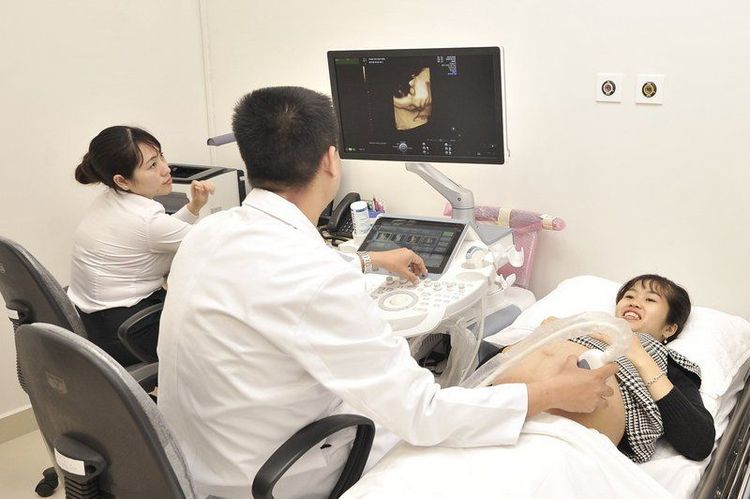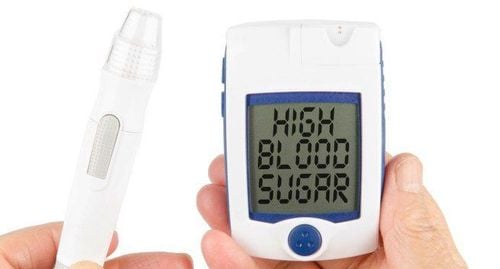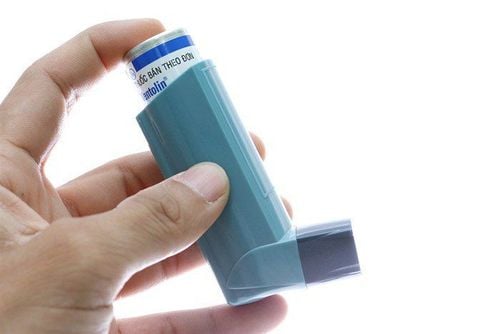This is an automatically translated article.
The article was professionally consulted by Dr. Nguyen Van Dinh - Head of Respiratory - Asthma - Allergy - Clinical Immunology Unit, Vinmec Times City International Hospital.Asthma is a common disease in pregnancy, the incidence can be over 8% of pregnant women. If asthma is not well controlled, it can seriously affect both mother and baby. Here are some frequently asked questions about asthma and pregnancy that readers can refer to for treatment and prevention.
1. Can women with bronchial asthma get pregnant safely?
Asthma is a respiratory disease, if it is well controlled, the patient can live with this condition like a normal person, can still get pregnant and give birth. However, due to the risk of the disease, it is necessary to be closely monitored during pregnancy to ensure the safety of mother and baby.
2. What is the risk to mother and baby during pregnancy?
The majority of women with bronchial asthma and their fetuses do not suffer complications during pregnancy and labor when their asthma is well controlled, conversely, if the asthma is not controlled, breathing difficulties are frequent. lead to fetal hypoxia, causing complications for the fetus: fetal distress, premature delivery, fetal growth retardation. Hypertension and preeclampsia can be seen in the mother.
Regular treatment and regular follow-up help reduce complications for both mother and baby.
3. What should be paid attention to before and during pregnancy?
You should inform your doctor about your planned pregnancy in advance. Your doctor will advise when your medical condition allows for a safer pregnancy.
Before becoming pregnant, in addition to the preparation work like other normal women, women should be vaccinated against diseases: Measles, mumps, Rubella, HBV before pregnancy, flu vaccination can be during pregnancy due to There is no evidence of harm to the fetus.

During pregnancy:
Pulmonary function : when combined with home measurement of peak flow. Peak flowmeter plays a very important role in monitoring and controlling the disease, depending on the condition of the disease, it can be measured twice a day, morning and night, 12 hours apart, but remember to reduce the peak flow, which signals the worsening of the disease even feel completely healthy
Blood pressure measurement , blood and urine tests : Evaluation of complications of hypertension , preeclampsia .
Fetal development status: It is necessary to repeat the pregnancy ultrasound between 18-20 weeks of pregnancy to evaluate the development of the fetus, if the pregnant woman needs to use oral corticosteroids, the ultrasound should be repeated every 4 weeks. 20 weeks to ensure normal fetal development. In patients with recurrent episodes of bronchial asthma, additional fetal movements should be measured during ultrasonography.
Ensure a stimulant-free lifestyle (coffee, passive smoking, alcohol) and minimize allergens that can cause disease exacerbation (should be tested for specific allergens before treatment). get pregnant if you have allergic asthma)
4. Progression of bronchial asthma during pregnancy?
Pregnancy does not mean that it will make asthma worse, it depends on each woman, asthma can be mild (usually improves gradually), does not have an asthma attack during pregnancy or is stable. determined as before pregnancy (30% of pregnant women). However, the condition may be more severe in one-third of pregnant women with asthma, which is common between 29 and 36 weeks of pregnancy. Serious illness is rare in the last week of pregnancy and during labor.
The severity of asthma symptoms during the first pregnancy is often the same as in subsequent pregnancies.
5. Does asthma treatment affect the fetus?
Depending on the condition of the disease, during pregnancy, the treatment drug will be adjusted and the appropriate dose adjusted to ensure stable disease control without affecting the fetus. Pregnant women should adhere to treatment to limit the occurrence of asthma attacks, which also helps to limit the use of drugs that can affect the baby.Bronchodilators spray, inhale.
Inhaled glucocorticoids: Commonly used during pregnancy such as budesonide and beclometasone.
Oral glucocorticoids: Treatment experience shows that glucocorticoids are quite safe for both mother and fetus, although some studies indicate a very small incidence of cleft palate when the mother is used orally under 13 weeks of pregnancy. There are also studies showing an association with complications of preterm birth and low birth weight of the fetus, but this complication has not been ruled out in relation to asthma attacks during pregnancy. In fact, the risk above may be much smaller than the risk when severe asthma is left untreated because it can be fatal for both mother and baby. Some other drugs used during pregnancy include: theophyllin, anti-leukotrienes, antihistamines (diphenhydramine, ferofenadin, cetirizine, loratadine) and specific immunotherapy while in progress.
Biologic drugs such as: Omalizumab does not have much research evidence on its safety, but initiation of use during pregnancy is not recommended), other drugs such as IL-5 antagonists are not available at this time. research.
6. What to do if you have an asthma attack during pregnancy?
During pregnancy, asthma attacks most often appear at week 17-24 of the cycle, the reason is unknown but can also be related to the discontinuation of medication due to incorrect understanding of the disease.
When you have an asthma attack during pregnancy, home management is the same as if you were not pregnant (preferably with a short-acting inhaled bronchodilator such as albuterol). However, it is necessary to be hospitalized to monitor the condition of both mother and baby and receive timely treatment because of the high risk of complications.

7. Postpartum care
Usually asthma symptoms return to their baseline status after the first 3 months postpartum.Breastfeeding is recommended. Besides the usual nutritional, immunological and psychological benefits for mother and baby, breastfeeding can reduce the risk of wheezing episodes in the first 2 years of life. . Some drugs can pass through milk into the baby's body, so you need to consult your doctor about suitable drugs to treat during this period.
In short, bronchial asthma is not a contraindication of pregnancy, the mother and the fetus can be completely healthy if:
Plan to become pregnant and notify the doctor in advance to determine the time of pregnancy appropriate depending on stable disease status. Equip yourself with basic knowledge about the risks during pregnancy, measures to prevent asthma attacks, the process of raising children and proper nutrition. Adhering to treatment, antenatal check-ups and bronchial asthma periodically, absolutely do not give up drugs to avoid unnecessary danger to mother and fetus. When symptoms worsen at home, in addition to management of the relief, immediate hospitalization is required for close monitoring and appropriate care.
8. Will children born later have bronchial asthma?
Although the pathogenesis is complicated related to internal factors and interactions with the environment, children will be at risk of bronchial asthma and other diseases (atopic dermatitis, urticaria, .. ) higher than other children, especially if both parents have allergic bronchial asthma.
If you have unusual symptoms, you should be examined and consulted with a specialist.
Please dial HOTLINE for more information or register for an appointment HERE. Download MyVinmec app to make appointments faster and to manage your bookings easily.














